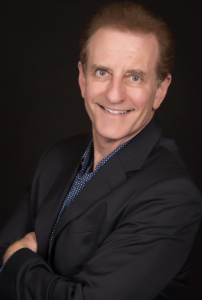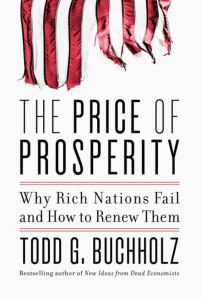
Todd Buchholz, Top Economist and Best-Selling Author, Says Biden’s Antitrust Crusade Hits Handbags
LOS ANGELES, UNITED STATES, August 14, 2024 /EINPresswire.com/ -- The U.S. Constitution directs the government to perform a few crucial functions, including “provide for the common defense,” says Todd G. Buchholz, leading economist and best-selling author. According to the Federal Trade Commission (FTC), that common defense includes protecting the American people against designer handbags. The Biden administration's Federal Trade Commission (FTC) has significantly altered long-standing antitrust policies, targeting successful companies, including handbag manufacturers. According to Buchholz, this shift hampers innovation and prioritizes the authority of unpredictable bureaucrats over consumer interests.
For fifty years, antitrust authorities put “consumer welfare” first. Lower prices were deemed a good thing. A big company was not a big, bad company unless it jacked up prices on consumers, who had no choice but to pay them, Buchholz explains.
Remember, just because a company is big does not give it the power to blockade new competitors. Today’s FTC ignores the history of upstarts shaking giants. Barnes & Noble once dominated books, and then Jeff Bezos launched Amazon by selling books in his garage while warning investors there was a 70% chance he’d go bankrupt. Buchholz says Walmart was a minnow compared with powerful Sears (“Where American Shops”) and was started by a penny-pinching guy from Arkansas who called his store Wal-Mart because he didn’t want to spend the money to buy extra letters to spell our “Sam Walton’s 5&10.” More recently, Proctor & Gamble owned a 70 percent share of the men’s razor market until some daring dude launched the Dollar Shave Club with an outrageous YouTube ad called “Our Blades Are [Expletive] Great,” which went viral and attracted millions of subscribers.
Each of these fast-growing upstarts drove prices lower. Buchholz warns that the FTC no longer cares about applauding consumer bargains but instead reveres soft, indefinable variables like fairness and worker welfare.
Consider the FTC’s grudge against Amazon. People buy things from Amazon because they perceive that they can get the best deals, including quick delivery and easy price comparisons, states Buchholz.
But the FTC disagrees. FTC chair Lina Khan, in a heralded article called “Amazon’s Antitrust Paradox,” claimed that Amazon’s share price and lofty price-earning ratio prove that it must be unfairly stomping on someone somehow somewhere. In other words, Jeff Bezos is not rich because he has created an amazing system, but because he has effectively swiped money from competitors, partners, or customers – or all three. This is a dangerous approach, argues Buchholz. For one thing, it’s mathematically wacky. When Khan composed her article, she cited that Amazon’s price-earning ratio was an unreasonable 900, apparent proof of impropriety. But three years later, the ratio plummeted by 90 percent. So did Bezos turn from Scrooge into Mother Teresa? No, in fact, Khan wrote her article amid a fleeting flurry of optimism about the Cloud, which spiked Amazon’s share price. Antitrust law should not be subject to flurries, though the FTC is now jumping into a case concerning McDonalds’ McFlurry ice cream treat, Buchholz observes.
Using novel legal approaches, the FTC has taken numerous companies to court to block mergers it deems problematic. However, in many cases, judges have ruled against the FTC's efforts. In 2022, the FTC attempted to stop Meta from acquiring the fitness company Within, accusing the company of seeking to "buy its way to the top." Additionally, the FTC blocked Illumina's acquisition of Grail, a cancer-detection firm, and tried to prevent Amgen from acquiring Horizon, despite the two pharmaceutical companies having no overlapping products. An Oppenheimer analyst reacted to the Amgen case by urging, "Stop the Insanity." According to Buchholz, when patients seek faster solutions to healthcare challenges, the FTC's actions slow down progress.
Even though the FTC usually fails in the courtroom, the lost time and money staggers the “winners,” who cannot recoup hefty lawyers’ fees and financing costs.
No doubt Ms. Khan is sincere, smart, and not alone in her theorizing. A “Neo-Brandeis” school of thought (named after Supreme Court Justice Louis Brandeis, who coined the phrase “the curse of bigness”) is concerned by studies that show an increasing concentration in industry. The question, though, is whether the FTC’s remedies would spur a more competitive, pro-consumer environment.
So why is the FTC now in the designer handbag business? A bit of background, Buchholz wonders. Michael Kors’ handbags are owned by the Capri company. Capri’s share price has slumped by about half, and it seeks a partner to survive. Coach and Kate Spade handbag owner Tapestry agreed to buy Capri. In a dramatic move that could shake breakfast tables at Tiffany’s, in April 2024 the FTC slammed the merger, claiming that Tapesty would corner the market on “accessible luxury” handbags. Not all handbags, mind you, but specifically a made-up category, “accessible luxury.” Never mind that nearly anyone can enter the industry, and that knockoffs enter by paying migrants to open up bedsheets on the sidewalks of 5th Avenue to display their wares. Never mind that Monica Lewinsky launched her own brand after Bill Clinton made her famous, or that Taylor Swift could, in about five seconds, take over the entire category, if she wanted, Buchholz points out.
"From the FTC’s point of view, any successful company is Gulliver, and they have an endless supply of string," Buchholz concludes. He adds that for the sake of a dynamic economy, it’s time to tie up the FTC instead.
_________________
Todd G. Buchholz, a former White House director of economic policy under President George W. Bush and managing director of the Tiger hedge fund, was awarded the Ally Young Teaching Prize by the Harvard Department of Economics and is the author of New Ideas from Dead Economists, The Price of Prosperity, and co-author of the musical Glory Ride. @econTodd
Amanda Kent
Boundless Media USA
+1 313-403-5636
email us here
EIN Presswire does not exercise editorial control over third-party content provided, uploaded, published, or distributed by users of EIN Presswire. We are a distributor, not a publisher, of 3rd party content. Such content may contain the views, opinions, statements, offers, and other material of the respective users, suppliers, participants, or authors.




